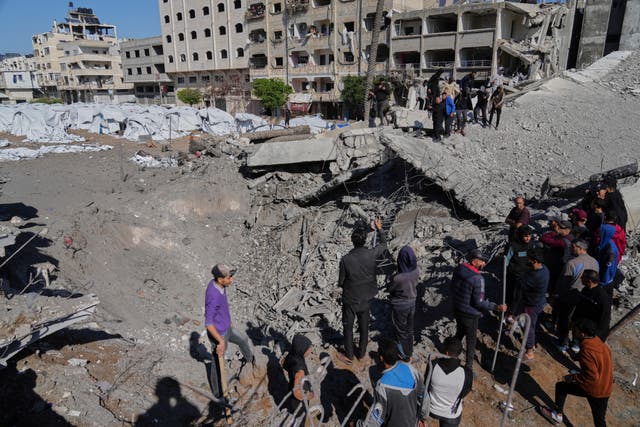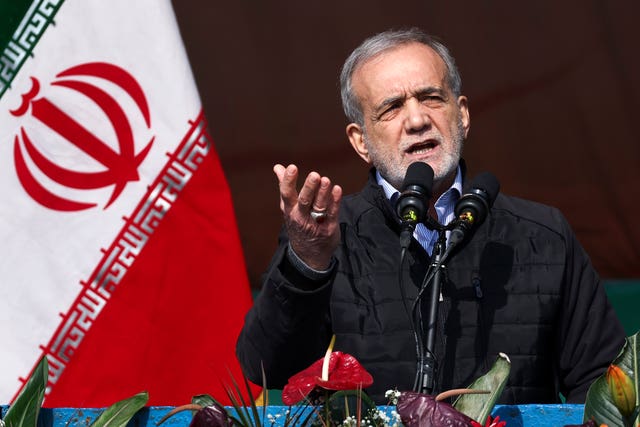Iran rejects direct negotiations with US after Donald Trump letter
Mr Trump’s overture came as Israel and the US warned they will never let Iran acquire a nuclear weapon.

Iran’s president has rejected direct negotiations with the US over its rapidly advancing nuclear programme, in Tehran’s first response to a letter Donald Trump sent to the country’s supreme leader.
President Masoud Pezeshkian said Iran’s response, delivered via the sultanate of Oman, left open the possibility of indirect negotiations with Washington, although such talks have made no progress since Mr Trump in his first term unilaterally withdrew the US from Tehran’s nuclear deal with world powers in 2018.
Regional tensions have since boiled over into attacks at sea and on land. Then came the Israel-Hamas war in the Gaza Strip, which saw Israel target militant group leaders across Iran’s self-described Axis of Resistance.
Now, as the US conducts intense air strikes targeting the Iranian-backed Houthi rebels in Yemen, the risk of military action targeting Iran’s nuclear programme remains on the table.

“We don’t avoid talks; it’s the breach of promises that has caused issues for us so far,” Mr Pezeshkian said in televised remarks during a cabinet meeting. “They must prove that they can build trust.”
The US State Department responded: “President Trump has been clear: the United States cannot allow Iran to acquire a nuclear weapon.
“The president expressed his willingness to discuss a deal with Iran. If the Iranian regime does not want a deal, the president is clear, he will pursue other options, which will be very bad for Iran.”
Mr Trump said before Mr Pezeshkian’s comments that he was considering military action and secondary tariffs if Iran does not agree to a nuclear deal.
“If they don’t make a deal, there will be bombing and it will be bombing the likes of which they have never seen before,” Mr Trump said in a comment aired on Sunday by NBC News.
Mr Pezeshkian was elected half a year ago after campaigning on a promise to re-engage with the West.
Since Mr Trump’s election and the resumption of his “maximum pressure” campaign on Tehran, Iran’s rial currency has gone into freefall. Mr Pezeshkian had left open discussions until February when Iran’s 85-year-old Supreme Leader Ayatollah Ali Khamenei warned Mr Trump that talks “are not intelligent, wise or honourable” with his administration.

The Iranian president then immediately toughened his own remarks on the US.
Press TV, the English-language arm of Iranian state television, published an article last week that included listing US bases in the Middle East as possible targets for attack. The list included Camp Thunder Cove on Diego Garcia in the Indian Ocean, where the US is basing stealth B-2 bombers which are likely being used in Yemen.
“The Americans themselves know how vulnerable they are,” warned Iranian parliamentary speaker Mohammad Bagher Qalibaf on Friday. “If they violate Iran’s sovereignty, it will be like a spark in a gunpowder depot, setting the entire region ablaze. In such a scenario, their bases and their allies will not be safe.”
Tehran’s two recent direct attacks on Israel with ballistic missiles and drones caused negligible damage, while Israel responded by destroying Iranian air defence systems.
Mr Trump’s letter arrived in Tehran on March 12, but he has offered little detail on what he told the supreme leader.
“I’ve written them a letter saying, ‘I hope you’re going to negotiate because if we have to go in militarily, it’s going to be a terrible thing’,” he said.
The letter came as Israel and the US warned they will never let Iran acquire a nuclear weapon, leading to fears of a military confrontation as Tehran enriches uranium at near weapons-grade levels of 60% purity — something only done by atomic-armed nations.
Iran has long maintained its programme is for peaceful purposes, even as its officials increasingly threaten to pursue the bomb. A report in February, by the Vienna-based International Atomic Energy Agency, the UN’s nuclear watchdog, said Iran has accelerated its production of near weapons-grade uranium.





